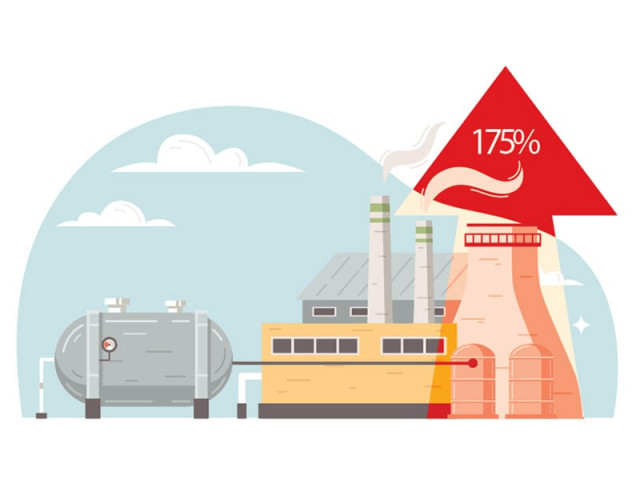Gas price hike for fertiliser plants sought
Issue of raising gas prices by 175% may go to ECC next week

The government has initiated discussions to increase gas prices for the remaining six fertiliser plants aimed at preventing the possibility of windfall profits of around Rs100 billion due to its earlier decision to raise prices for only four plants.
The issue of gas prices in the range of 175%, or Rs1,017 per mmbtu, may go to the Economic Coordination Committee (ECC) of the Cabinet next week, along with another proposal to prioritise gas allocation to the industrial sector, according to government sources.
Earlier this month, the Special Investment Facilitation Council (SIFC) approved giving priority gas supply to the industrial sector, alongside residential and commercial users. The SIFC has approved the new gas supply merit order, with the ECC’s approval pending to finalise it. Under the revised order, fertiliser and power plants would receive second priority.
Sources said the deliberations about gas price increases are taking place separately in the Ministry of Finance and the Ministry of Energy after the fresh revision in gas prices for four fertiliser plants created a lacuna. Authorities have concerns that these six plants might exploit the gap to raise urea prices despite no increase in their input costs.
The federal cabinet increased gas prices on Wednesday in the range of 29% to 700% for four fertiliser plants receiving gas through the networks of Sui Northern Gas Pipelines Limited (SNGPL) and Sui Southern Gas Company Limited (SSGCL). It did not adjust prices for six other plants receiving gas from the Mari gas network.
Gas prices for Fatima Fertiliser and Agritech increased by 29%, for the new Engro Fertiliser plant by 700%, and for Fauji Fertiliser Bin Qasim Limited plant by 175%. After the increase, gas prices for these plants are now equal to the prescribed price of Rs1597 per mmbtu. However, this move discriminates against these plants compared to six others getting gas from the Mari Petroleum Company Limited network.
Read: SITE association president condemns gas tariff hike
Mari Petroleum Company Limited (MPCL) is entitled to receive wellhead gas prices in accordance with relevant agreements with the government for gas produced from its various natural gas reservoirs. Mari Field wellhead gas prices are determined and notified by OGRA bi-annually under the Oil and Gas Regulatory Ordinance.
The six plants receive gas at the rate of Rs580 per mmbtu for feedstock, which is Rs1017 or 64% less than the prices for the other six plants. Three out of the six plants belong to Fauji Fertiliser Company (FFC), one old Engro fertiliser plant, one plant of Fatima Fertiliser, and the Pak-Arab Fertiliser Limited plant.
According to some estimates, the increase in input costs for the four plants, which produce less than 40% of the total urea, may result in about a Rs750 per urea bag increase. The six plants produce about 63% of the total fertiliser and can get away with Rs100 billion in windfall profits even by keeping prices slightly lower than other manufacturers.
However, if the government increases gas prices, these six plants may have to cover the difference above Rs580 per mmbtu and the new rate in the form of the Gas Development Surcharge (GDS). Additional GDS revenue would go to the provinces. Gas Supply Agreements for six Mari-based plants are valid until June 2024.
Despite receiving billions of rupees in subsidies in the past, the four plants did not significantly benefit farmers.
Sources said that there is a possibility that a summary might be taken to the ECC next week to end the disparity in rates among all ten fertiliser plants. But along with the decision on gas prices, there must be a solution to use the GDS, as the additional funds given to the provinces can be used for other farming-related purposes, they added.
Urea is available in the market in the range of Rs5,000 to Rs5,500 compared to notified prices of around Rs3,600 per bag.
The issue of urea price increases due to an increase in gas prices was discussed at the last ECC meeting.
Industry Minister Gohar Ejaz was of the view that manufacturers would not increase prices because they were already selling the product at higher rates in the black market. However, the energy minister believed that fertiliser companies would increase prices, and there was no effective mechanism to stop them. Some ECC members believed that fertiliser plants should not be charged uniform rates, which was not accepted.
Published in The Express Tribune, February 18th, 2024.
Like Business on Facebook, follow @TribuneBiz on Twitter to stay informed and join in the conversation.



















COMMENTS
Comments are moderated and generally will be posted if they are on-topic and not abusive.
For more information, please see our Comments FAQ